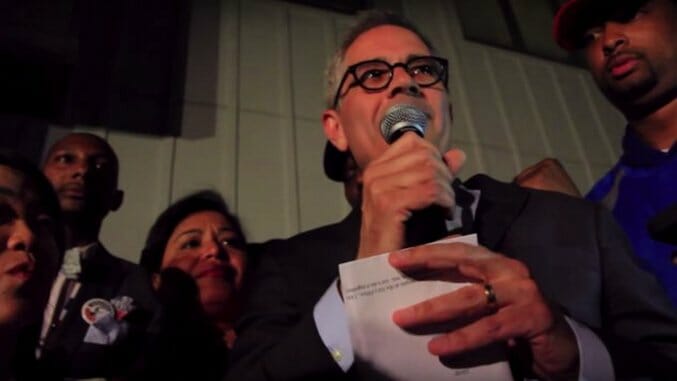Larry Krasner, a Progressive, Just Won the D.A. Primary in Philly. Here’s What His Victory Can Teach the Left

On Tuesday night, a 56-year-old bespectacled criminal defense attorney gave criminal justice reformers their biggest win yet. Larry Krasner won a crowded seven-candidate Democratic primary against practically the entire Philadelphia establishment to become the party’s nominee for District Attorney; in a city where Hillary Clinton defeated Donald Trump by sixty-seven points, Krasner is a heavy favorite to win the general election on Nov. 7.
In the famously conservative realm of district attorneys, Larry Krasner might as well be Emma Goldman. According to a recent Mother Jones profile, he’s represented Occupy and 2012 Republican National Convention protesters, sued the police over seventy-five times for civil rights violations, and gotten over eight hundred narcotics convictions thrown out. Not to mention he’s never prosecuted a case in his life; in response to concerns that he’d be “soft” on crime, Krasner responded, “I don’t really think there’s anything tougher than being a criminal defense attorney who represents poor people up against the power of government, which has infinite resources when you’re basically doing war with your fingernails.”
As you would expect from someone who has seen the worst abuses of the justice system, Krasner’s platform is a laundry list of criminal justice reform goals for progressives. Among other things, Krasner wants to end the death penalty, cash bail imprisonment, stop and frisk, and civil asset forfeiture. He’s also promising to fight the Trump administration on immigration and Jeff Sessions’ renewed drug war.
Perhaps most notably, he seems willing to take on police misconduct, which is a far cry from the vast majority of prosecutors. “Larry will keep up the pressure for reform by rejecting cases that rely on abusive or discriminatory actions by the police, by prosecuting police when appropriate, and by making the case that good policing is more effective than the divisive law enforcement tactics encouraged by politicians like Trump and Sessions,” Krasner’s website reads.
Predictably, the powerful city establishment came out against Krasner: the city’s Fraternal Order of Police, both the Philadelphia Inquirer and the Philadelphia Daily News, and former Democratic Senate candidate Katie McGinty all endorsed the eventual third-place finisher, Rich Negrin. And last week, a group of former ADAs released an open letter against Krasner which called him a “candidate who is dangerous to the city.” Krasner’s endorsements, meanwhile, mostly came from a litany of social justice, labor, and progressive organizations — and, notably, in the form of a $1.45 million donation from George Soros.
To put it simply, Krasner can be a generational reformer. If he’s successful, Philadelphia’s next district attorney will redefine what success means in an office where “results” usually means a high conviction rate and a vague notion that “criminals” are being kept off the streets. The importance of his victory for the city’s marginalized citizens, and families who come in contact with the system, can’t be overstated.